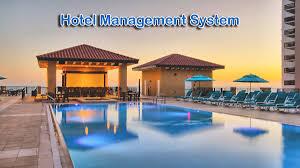Hotel Management Systems

The hospitality industry has always been at the forefront of customer service innovation. In today's digital age, Hotel Management Systems (HMS) are revolutionizing how hotels operate, ensuring seamless guest experiences and streamlined operations behind the scenes.
What is a Hotel Management System?
A Hotel Management System is a comprehensive software platform designed to manage all aspects of a hotel's operations. From front-desk management and housekeeping coordination to guest communications and revenue tracking, HMS solutions centralize hotel functions into one easy-to-use interface.
Whether it's a boutique inn or a large hotel chain, an HMS helps hoteliers automate tasks, reduce human error, and enhance service delivery.
Core Features of Hotel Management Systems
1. Reservation & Booking Management
HMS platforms simplify the booking process by integrating with online travel agencies (OTAs), direct hotel websites, and even in-person reservations. This ensures real-time availability, minimizes overbooking, and improves customer satisfaction.
2. Front Desk Operations
Check-ins, check-outs, room assignments, guest profiles, and billing are all managed from a single dashboard. Some systems even allow for mobile check-in or digital keys, providing a modern guest experience.
3. Housekeeping Management
Staff can be assigned tasks and update room statuses in real-time using mobile apps. This results in faster room turnovers and better communication between departments.
4. Point of Sale (POS) Integration
Restaurants, bars, spas, and gift shops within the hotel can be integrated into the system, ensuring all guest charges are automatically linked to their room bill.
5. Customer Relationship Management (CRM)
An HMS collects valuable data on guest preferences, visit history, and feedback. This information can be used to create personalized experiences, loyalty programs, and targeted marketing campaigns.
6. Revenue & Channel Management
With integrated channel managers, hotels can update prices and availability across multiple booking platforms simultaneously. Revenue management tools also analyze demand and competition to suggest optimal pricing strategies.
7. Reporting & Analytics
Detailed reports on occupancy, revenue, guest satisfaction, and more allow hotel managers to make informed business decisions and spot areas for improvement.
Benefits of Using a Hotel Management System
✅ Efficiency: Automation of routine tasks saves time and reduces labor costs.
✅ Accuracy: Reduces human error in bookings, billing, and inventory.
✅ Improved Guest Experience: Faster check-ins, personalized service, and smoother operations enhance satisfaction.
✅ Increased Revenue: Dynamic pricing and better inventory control lead to more bookings and higher profits.
✅ Scalability: Cloud-based systems allow hotels to grow without major IT investments.
Cloud-Based vs. On-Premise HMS
-
Cloud-Based Systems: Accessible from anywhere, with regular updates, lower upfront costs, and automatic backups. Ideal for small to medium-sized hotels.
-
On-Premise Systems: Require local installation and maintenance but offer more control and customization. Suitable for large hotel chains with IT support.
Popular Hotel Management Systems in the Market
Some leading HMS platforms include:
-
Opera PMS (Oracle)
-
Cloudbeds
-
Hotelogix
-
eZee FrontDesk
-
RoomRaccoon
Each system offers unique features catering to different hotel sizes and business needs.
Challenges in Implementing an HMS
While the benefits are substantial, some challenges include:
-
Initial Learning Curve: Staff may need time and training to adapt to new systems.
-
Cost: Subscription or licensing fees can be a concern for small businesses.
-
Integration: Ensuring the HMS works well with existing tools and third-party platforms.
However, with the right planning and support, these hurdles can be easily overcome.
Conclusion: The Future of Hotel Management
As technology continues to evolve, Hotel Management Systems are becoming smarter, more intuitive, and more indispensable. With AI-driven personalization, mobile integrations, and enhanced data analytics on the horizon, the future of hotel operations looks efficient, responsive, and guest-centric.
For hotels aiming to stay competitive and provide exceptional service, investing in a modern HMS is not just an option—it’s a necessity.
- Art
- Causes
- Crafts
- Dance
- Drinks
- Film
- Fitness
- Food
- Games
- Gardening
- Health
- Home
- Literature
- Music
- Networking
- Other
- Party
- Religion
- Shopping
- Sports
- Theater
- Wellness


